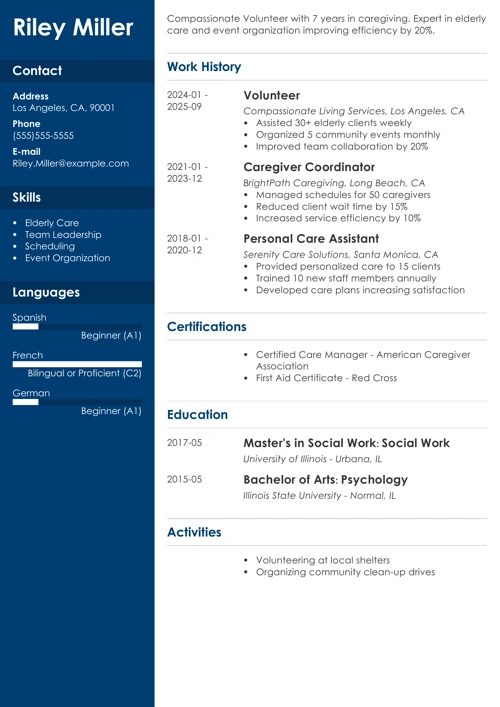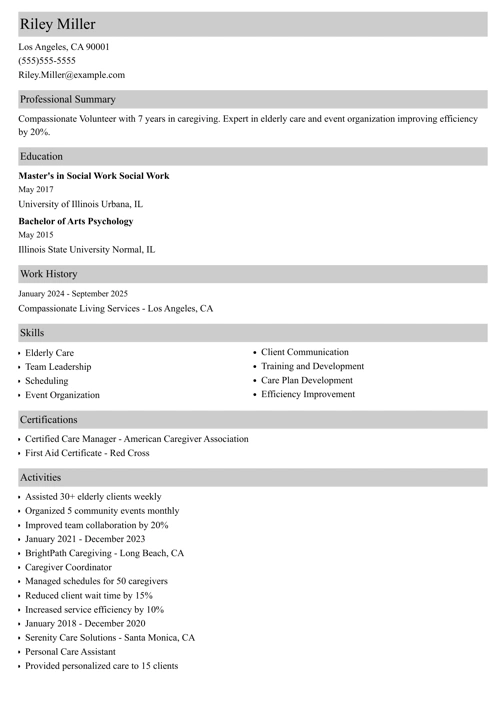A really good resume needs to tick off a lot of check marks in order to be great. It doesn’t help that the competition is at home wondering about how to make their resume just as good as yours or even better. To top it all off, recruiters will give you about 7 seconds of their attention before moving on to the next candidate.
Ouch.
But don’t throw in the towel just yet. We’ve made the ultimate resume critique checklist you can use to make sure that your resume makes a killing in the recruiting process.
Read on to find out how.
Want to save time and have your resume ready in 5 minutes? Try our AI resume builder. It’s fast and easy to use. Plus, you’ll get ready-made content to add with one click. See 20+ resume templates and create your resume here.
Sample resume made with our builder—See more resume examples here.
Why You Need a Resume Critique
A resume critique is a review of your resume to find any improvement areas in your resume’s format, design, relevance, and content. You can do a resume critique yourself or take advantage of several resume critique services online.
It’s not just about doing a resume review by swinging a red pen around or tearing your resume to shreds.
Lots of people don’t see the point in critiquing their resumes, they think their resumes look just fine. But there are two things that don’t play in our favor:
- Content side: we’re subjective. We’re emotionally attached to things we create and so judge it less critically.
- Technical side: our brains see what we wanted to say and so self-editing is less than ideal.
A resume critique, especially done by a qualified third party can give a fresh, professional, and unbiased perspective on your resume. It can offer constructive criticism not only on the impression you make as a candidate, but also if your resume responds to the hiring manager’s needs.
And who wouldn’t want that? After all, better resume=better chances of getting that interview.
Read more: The Best Resume Writing Tips
Making a resume with our builder is incredibly simple. Follow our step-by-step guide, use ready-made content tailored to your job and have a resume ready in minutes.
When you’re done, our AI resume builder will score your resume and our resume checker will show you exactly how to improve it.
Resume Critique Checklist
You don’t have to use a resume critique service online. We have a resume critique checklist you can use to work through your resume review and determine whether your resume is ready to send.
1. Resume Format and Style
Choosing the right resume format is critical since it can make or break your chances of demonstrating the right skills and job experience to the hiring manager.
- Have you chosen the best resume format for you? (reverse-chronological format, functional format, or combination format)
- Have you formatted your resume correctly? Check if you have:
- 1-inch resume margins on all sides.
- A professional, 12 pt resume font.
- Single or 1.15 line spacing throughout.
- Clearly marked resume sections.
- Double spaced between each section heading.
- Used bullet points instead of sentences or blocks of text for easier readability.
- A resume that is the ideal length of about 1 page (if you’re more experienced, a two-page resume is fine, too).
- Saved your resume format in PDF.
- Is the resume template appropriate to the industry you’re applying to (e.g. colorful templates won’t come off as well in conservative industries than in advertising/marketing)?
Read more: The Ultimate Resume Writing How To
2. Resume Sections
Resume sections clearly identify what the hiring manager is looking at and helps them navigate your resume. Recruiters spend little time on each resume, so you want to help them find what they’re looking for fast.
- Are all your resume sections labeled clearly?
- Do your resume sections stand out and attract attention?
- Is the information listed in each section relevant to that section?
- Have you listed your greatest accomplishments and achievements?
- Is your resume header professional and up to date?
- Is your resume profile engaging? Have you correctly chosen between using a resume summary or a resume objective?
- Does your work experience section have relevant entries with no more than 6 bullet points each?
- Does your resume education section include the school name, years studied, and degree obtained? Is your unfinished college or continuing education listed correctly?
- Does your resume skills section list relevant and key job skills?
- Do the additional sections of your resume add value and include things mentioned in the job ad? Examples of this would be projects, awards, language skills, volunteering, hobbies & interests, publications, and licenses & certifications.
Read more: The Best Resume Sections Format
3. Resume Content and Relevance
You checked the sections of your resume, now it’s time to focus your resume review on content. If the content doesn’t refer to the job ad, there’s little chance the recruiter is going to be asking you over for a job interview.
- Do you use action verbs to list your accomplishments and career achievements?
- Did you use resume keywords to create an ATS-friendly resume template?
- Did you use bullet points instead of long sentences or paragraphs for easier scannability?
- Is your resume filled with key achievements and accomplishments instead of a laundry list of responsibilities?
- Are you using numbers to demonstrate quantifiable achievements?
- Did you tailor your resume to the job you’re applying for?
- Have you demonstrated both soft skills and hard skills that attest to your abilities as well as your personality?
- Does your resume read well (e.g. does it flow well and make sense)?
- Did you proofread your resume at least twice for typos and other errors?
Read more: What to Put on a Resume
Plus, a great cover letter that matches your resume will give you an advantage over other candidates. You can write it in our cover letter builder here. Here's what it may look like:
See more cover letter templates and start writing.
Key Takeaway
Critiquing your own resume may seem like a lot of work, but doing it now will help you refine your resume and save you potential embarrassment and never-ending rejection letters.
In the end, resume critiques are an investment in the future of your career!
About Zety’s Editorial Process
This article has been reviewed by our editorial team to make sure it follows Zety's editorial guidelines. We’re committed to sharing our expertise and giving you trustworthy career advice tailored to your needs. High-quality content is what brings over 40 million readers to our site every year. But we don't stop there. Our team conducts original research to understand the job market better, and we pride ourselves on being quoted by top universities and prime media outlets from around the world.





